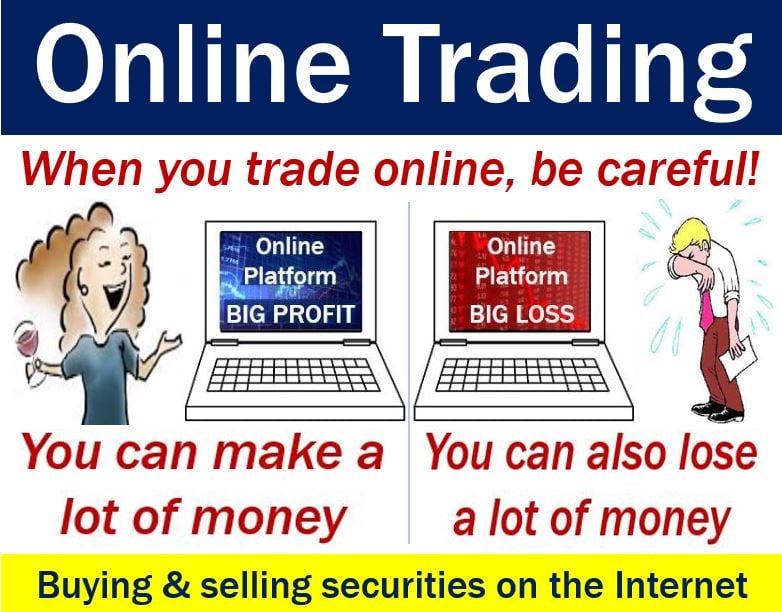Online Trading is the act of purchasing and selling financial products on the Internet. The trader buys and sells using an online trading platform. Online trading may include trading in bonds, stocks (shares), futures, international currencies, and other financial instruments.
Most people trade online through an online broker. An online broker is a brokerage firm that offers its services on the Internet. Unlike traditional brokers, the investor does not meet the broker face-to-face or via the telephone. Everything happens on the web.
In this article, ‘online’ means ‘on the Internet.’
Brokerage firms make online trading platforms available to anybody who wishes to trade in financial securities.
Online trading forms part of E-Commerce, which stands for Electronic Commerce.
Traditional vs. online trading
In the past, investors would call their broker to make a trade for them. They could either visit or telephone their broker. In fact, there was no other choice.
In the 1970s, for example, if I wanted to buy 100 IBM shares, I would call my broker. I would then place an order request. The broker would let me know what the IBM share market price was, and confirm the order to buy.
In the past, the whole procedure was relatively lengthy. The broker would confirm how long to keep the order open, which account to draw money from, etc.
Today, with online trading, it is a do-it-yourself world. In other words, online traders can buy and sell financial securities on their own. In fact, they can even carry out multiple trades with nobody else’s help.
Most importantly, the modern online trader can do all these things rapidly. In fact, almost instantly.

Online trading – greater control
The online trader has much more control over trades than the traditional trader. They can execute trades considerably faster than they ever could face-to-face or over the telephone.
Apart from being able to manage multiple positions simultaneously, the online trader has access to extensive data. Online brokers and other websites provide comprehensive information on companies, exchanges, and markets.
The Internet has opened the door to the investment world to a wide range of people. Today, not only can wealthy people execute trades, but also individuals further down the socioeconomic ladder.
This democratization of trading has led to the development of a plethora of educational resources, making financial literacy more attainable for aspiring traders. The rise of user-friendly mobile trading applications has significantly lowered the entry barrier, inviting even those with minimal investment experience to participate in the financial markets
In a HowStuffWorks article, Tracy Wilson writes that many ‘common’ people today own stock. Online trading has given any individual with a computer and some spare cash the opportunity to invest in the market.
Ms. Wilson wrote:
“You don’t have to have a personal broker or a disposable fortune to do it, and most analysts agree that average people trading stock is no longer a sign of impending doom.”
“The market has become more accessible, but that doesn’t mean you should take online trading lightly.”
Martingale Trading System
Successful online traders use various systems to make a profit. Basically, you double the amount you invest each time you lose, until you hit on a win. That way, when you do win, you recover all your losses plus your initial investment.
“Online trading,” example sentences
By exploring sentences that incorporate “online trading,” you can gain a clearer understanding of how this term fits into different narratives and discussions. Here are seven sentences that demonstrate the practical application of “online trading” in various contexts:
- “He started online trading as a hobby, but it quickly grew into a substantial source of income.”
- “The seminar on online trading emphasized the importance of risk management and developing a solid trading strategy.”
- “With online trading, you can react to market news instantly, which is a significant advantage over traditional trading methods.”
- “Online trading platforms have disrupted the financial industry, making it more accessible to the general public.”
- “She attributed her success in online trading to thorough research and maintaining discipline in her investment decisions.”
- “The volatile nature of online trading means that potential gains are high, but losses can be equally significant.”
- “They offer a comprehensive course on online trading, covering everything from stocks and bonds to cryptocurrency investments.”
